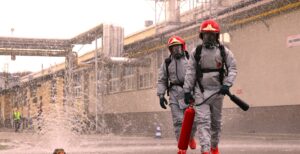
Influences on Labor in the Post Pandemic Era – America and the World
Many entities have offered predictions about the future of economic development, including the Los Angeles Economic Development Corporation (LAEDC). That agency recently released its 2023 Economic Forecast, detailing the opportunities and challenges emerging from the COVID-19 fog and its rippling repercussions. As one of many reports and analyses, it provides insights and opinions regarding present and future economic circumstances that are relevant at all levels of every community, both locally and globally.
Economic Headwinds Hinder Progress
The pandemic. Inflation. Global and social conflict. Climate change. Each of these concerns has impacted or is significantly impacting society, as are the consequent human responses made because of them. Looking back over the past three years, these pressures have made long-lasting or permanent impressions on the country’s economic and workforce sectors.
In Large Corporations
The four phenomena listed above have created challenging repercussions for the country’s larger firms and organizations. In many instances, these enterprises base their revenues on the price and availability of the commodities they use to produce their proprietary products. In virtually all of those cases, the impediments imposed over the past three years have generated supply chain woes that eroded both their earning capacity and their market share:
The variety and availability of transport options within the global supply chain network shrank considerably during the pandemic as purveyors closed their doors to prevent spreading the disease. Those that remained open were swamped, and both carriers and ports were stressed beyond their limits, causing delivery delays and service disruptions.
Environmental upheavals also contributed to the supply chain difficulties. Drought, floods, tornados, and violent storms all interfered with the production, manufacturing, transport, and delivery of billions of dollars worth of materials and goods. And those elements continue to create havoc; by the end of April 2023, just in the United States, there were seven weather-related events that each caused damages of more than one billion dollars.
Conflicts between nations around the world also negatively impact America’s economic fortunes, whether it is actively involved in them or not. The battle between Russia and Ukraine, general tension in East Asia, and the ongoing struggle of ‘Brexit’ all pose barriers between the U.S. and its international trading partners. China’s growing political influence makes the global situation darker, as well.
Because so many of these big businesses are also significant players in America’s economy, the economic injuries they suffer are felt throughout the entire country.
In Small Businesses
As a subset of the corporate community, the country’s ‘small business’ sector has experienced an uneven recovery post-pandemic when compared to the larger commercial venture segment. Several factors combine to add pressure on these smaller companies (typically defined by lower annual revenues or smaller employee headcounts):
Industry type plays a big role in the capacity of its constituents to survive an economic downturn. Service industries such as hospitality, leisure, and arts and entertainment lost significant financial ground through COVID, and many organizations within those quarters did not recover.
Changing modes of employment contributed to challenges as well. The shift to remote work in many industries has left whole swaths of commercial real estate vacant, and it’s unclear whether the demand for that type of office space will return.
Post-pandemic inflation has also eroded the small business’s ability to maintain its place within its market. Usually, available working capital is limited for these smaller enterprises, and higher prices for commonly used commodities drain those resources faster than before.
Small businesses comprise a large slice of the American economy; contractions within this segment impact every community in which they exist.
A Contentious Infrastructure
Another concern that is – and will continue – impacting the work of the future is the current roiling of today’s workforce environment. ‘How’ work gets done changed irrevocably during the pandemic, and those innovations continue to evolve. Additionally, social upheaval across the country underscored the significance and corrosive realities of embedded inequity barriers to economic growth. Reviewing current circumstances at the micro-local level reveals equally imposing challenges to a fully realized economic recovery.
Sector Restructures
So many ways of doing business are now obsolete as the industrial world embraces emerging technological innovations. Customers are no longer greeted at the shop door but instead place orders, file complaints, and pay their bills using their digital devices. The ‘digital’ factor alone has up-ended virtually every brick-and-mortar enterprise by eliminating the need for excess square footage and unnecessary staff while also requiring technology investments that had never been needed before. Larger organizations must also shift their operations to account for crisis-driven changes in their relationships with suppliers, regulators, and consumers.
Embedded Inequities
The social turmoil that exploded before and during the pandemic turned a glaring spotlight on how the embedded inequities built into many public systems leave large percentages of the population unprotected in times of trouble. In many cases, these unfair practices and policies were deliberately designed years ago to promote one class of people over another. In all cases, they result in the loss of an inestimable volume of invaluable yet wasted human resources.
Individually and collectively, the influence of each of the four catastrophic phenomena has been profound, and this time frame – 2020 through 2023 – will, most likely, be seen as the cumulative pivot point when society fully embraced the emerging ‘5th Industrial Revolution.’ They have irrevocably changed the definition of ‘work,’ how it is valued, and the value it will provide in the future. Looking forward, those changes also allow every community to redress past mistakes and build a stronger, more robust economic foundation to support everyone, regardless of heritage or history.


